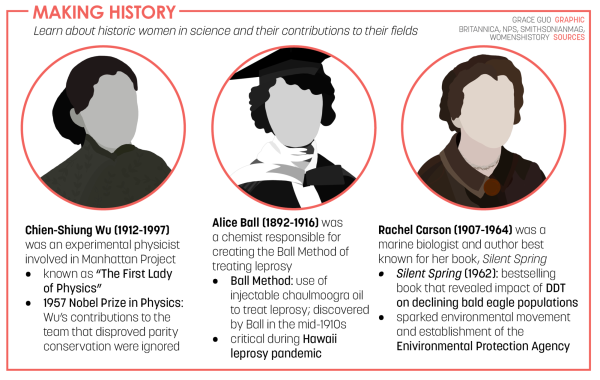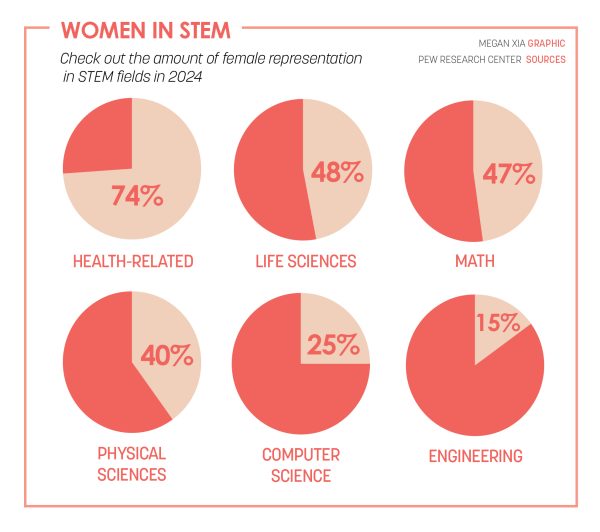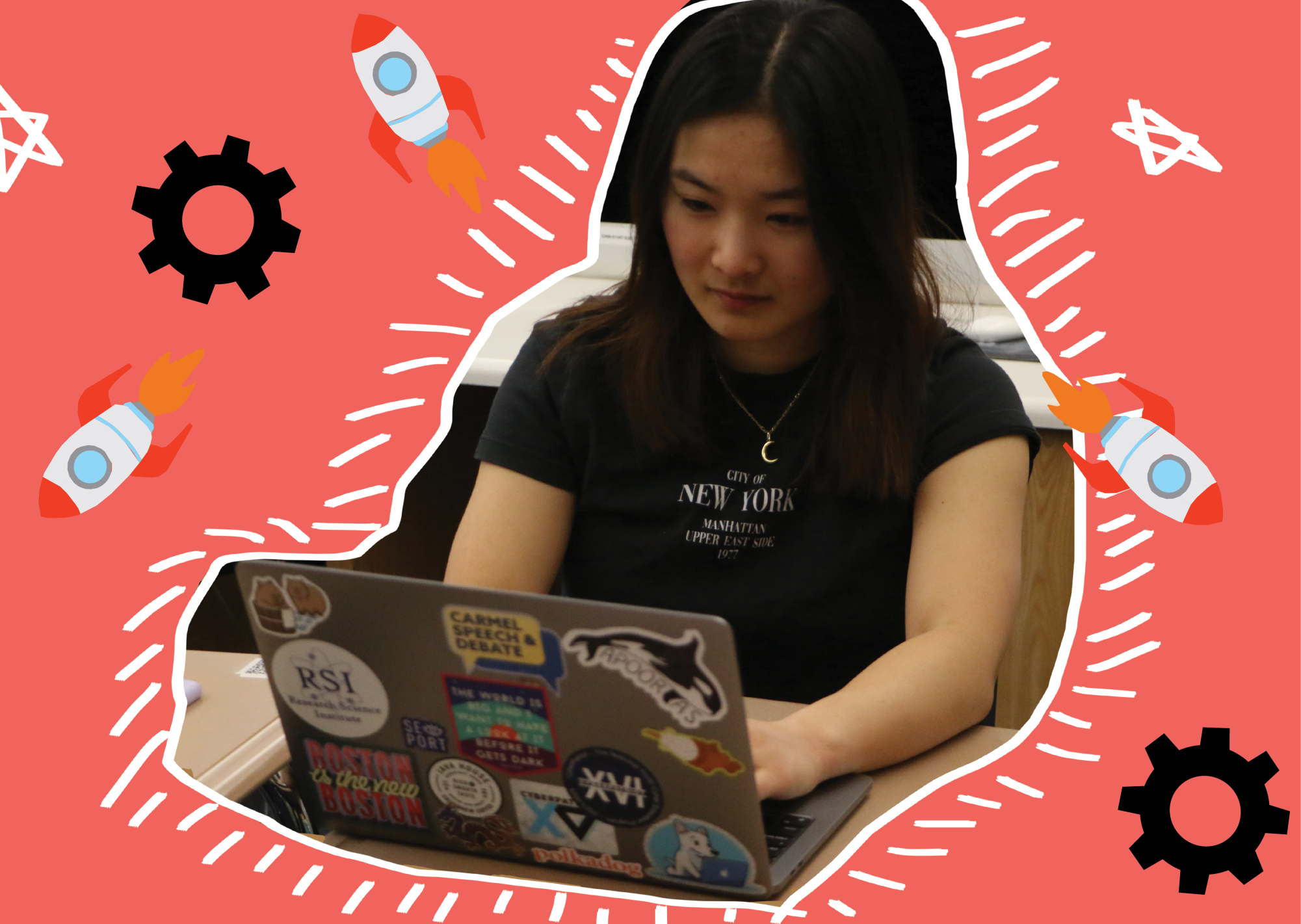Senior Alexandra “Sandra” Yang said she has always been passionate about computer science (CS); joining CS clubs never seemed like a hard decision for her. However, when she arrived at the callout meetings, Yang said she immediately noticed these clubs were almost always overwhelmingly male. Yang said women will often feel discouraged about joining these kinds of clubs when they notice the lack of female members.
“Say that you’re a girl and you’re not really sure (about joining a certain club), so you’re trying to try out all these different things, but you look at these clubs and there (are) like five girls in them, and like 95 guys,” Yang said. “When you’re just entering and surveying the field, lots of women peek in the door, look around and think ‘No, this isn’t for me,’ and leave.”
Yang’s perspective is reflected in the research. According to the National Science Foundation, women only occupied around one-third of all science, technology, engineering and math (STEM) jobs in 2021, while men occupied the remaining two-thirds.
Representation at CHS

Junior Evelina Rubchinsky said she has seen this kind of female underrepresentation at this school.
“I’ve been taking engineering classes for the past three years and this is the year that I’ve had the most girls in my class,” Rubchinsky said. “Freshman year we had, like, two girls, sophomore year was like three girls. (The issue) isn’t necessarily, ‘Oh I can’t be friends with guys,’ it’s (more that) it’s a little bit odd when you see only guys in these classes. (…) I feel like women don’t feel like they take those kinds of courses because I know that when people see (only guys in a class) they feel like it’s (only for guys).”
Yang said she has had similar experiences, and these experiences have often led to a sense of exclusion for women like her.
“You can see this (kind of exclusivity) in a lot of STEM clubs here at CHS. There’s a lot (of clubs) that are basically just a group of guys. You’ll walk in and it’s just a group of guys exclusively talking,” Yang said. “Even if you’re a girl like me who is passionate about it, and wants to share that passion with people, the second I step into that space, my gender automatically excludes me. I automatically become the outlier.”
However, Melinda Stephan, College and Career Resources Coordinator, said she has seen various efforts made to promote female engagement in recent years.
“(At this school), our courses in these underrepresented fields are open enrollment regardless of gender. We have female teachers in these areas that help female students see the possibility (of success),” Stephan said. “There are clubs and organizations like Girls Who Code both at the local and national level that serve to encourage women to pursue these less ‘traditional’ roles. I think this is representative of things happening beyond CHS on college campuses and professional organizations geared toward empowering and supporting women in male-dominated fields.”
Taking Action
Stephan also said while these efforts have been made, the issue is far from fully resolved.
“In some situations, women have to persist or endure in environments that are not always supportive of their interests, needs or success,” Stephan said. “While much progress has been made, women still have to put their foot in the door to keep it open and maintain and increase their presence in these fields.”
Similarly, both Rubchinsky and Yang said the academic field has shifted in recent years, but Yang ultimately said she has yet to see structural changes when it comes to underrepresentation.

“There’s been a lot more awareness about it, but I wouldn’t say there’s been more definitive action about it,” she said. “As (these academic fields) have changed, people have started recognizing and acknowledging that it’s a problem, but we’re not at the step yet where people are actually taking concrete action about it.
“It’s all well and good to say that this is a problem, but none of that matters unless we can find a solution,” she added. “That’s going to be the biggest thing (to focus on) in the next 10 or 20 years in equality: figuring out ‘how do we even fix this issue that is so deeply ingrained in society?’”
Additionally, Rubchinsky said, at CHS, attempts at decreasing underrepresentation are largely because of changes in society.
“I think there’s definitely been some efforts (at CHS),” Rubchinsky said. “I think that most of it doesn’t necessarily come from CHS (itself, it mostly) comes from societal pressures and changes.”
Historically Rooted Issues
Stephan said female underrepresentation has deep historical roots and has only started to decrease as of late.
“It’s only in our relatively recent history that women were allowed to pursue education beyond the basic functional skills needed for living and raising a family,” Stephan said. “Clearly the role of women has changed significantly and progress has occurred, but there is certainly still—both in terms of mindsets and opportunities—for women to be fully represented across all fields.”
Rubchinsky said she agreed, and historically, people generally showed less regard for educated women and their contributions.
“(In the past), people would make the justification that women are too pure to do work so they didn’t let women (work); there’s also (the issue of) masculinity and femininity and that men are ‘better,’” Rubchinsky said. “When I was little, my dad would tell me about women in science, but I would be like, ‘We’re not learning about any of these people at school.’ In physics right now, (we’re learning about) Galileo, but we don’t learn about the women. Or in history, each chapter has a little thing in the textbook about women, and the thing is literally five words long because nobody cared about the women and they didn’t document anything about them.”
Yang said she agreed, and that historical patterns have established female underrepresentation across academic fields as a societal norm.
“So (many issues are) because (attitudes toward women in STEM) are implicit,” Yang said. “That’s precisely what makes it so difficult to address and what makes it so difficult to handle. It’s like, if you call it out, people will think you’re overreacting or you’re oversensitive.
“A lot of male-identifying people just aren’t aware of that. They’re not aware of the fact that they have to be more inclusive, so it’s naturally very exclusive behavior. It’s very difficult to address because it’s very natural to them, but it’s precisely because it’s so natural and so ingrained within them that it excludes women like me from these spaces,” she added.
Looking to the Future
Ultimately, Rubchinsky said increasing female representation across the academic world sets a precedent for future generations of women.
“It’s really important to show the new generation that they can do it too,” Rubchinsky said. “For girls right now, it’s

harder, but you do get rewarded. For example, my mom is the only woman (at her level), and she knows she got there not necessarily because she’s a woman, but because she’s good enough for that. (It’s important to) show people they can get there not because of their gender, not because of their ethnicity or race or anything, but because of you.”
Moving forward, Yang said she thinks it is important that women pursue their interests, despite gender disparity. She said it is especially important as we face more and more global issues.
“Passion is something that is evenly distributed at the beginning, and it’s such a waste, if (a girl) is brilliant and smart and passionate doesn’t enter a certain space because they’re being discouraged by gender inequity in that space,” Yang said. “At the point where we’re facing so many issues with our world right now, we just need more people. Why should an entire half of the global population be discouraged from pursuing these kinds of fields that are uniquely suited to problem-solving and addressing the problems we face today?”
Stephan said she agreed, and said women’s contributions can benefit their academic fields immensely.
“Women have so much to offer,” she said. “Their perspectives and approaches can only add to the advancement of the fields when there is diversity of thought and experience. I think when you notice the increase in the number of women CEOs or women in STEM, it’s clear that their involvement adds value and is vital.”


